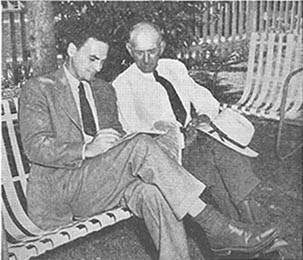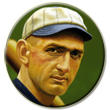Joe Jackson 1949 Sport Magazine Interview
This is the Truth!
"Why you cheap so-and-so! Either me or you --one of us is going out that window."
I started for him, but he ran out the door and I never saw him again. Those four people offered their testimony at my trial. Oh, there was so much talk those days, but I didn't know anything was going on.
When the talk got so bad just before the World Series with Cincinnati, I went to Mr. Charles Comiskey's room the night before the Series started and asked him to keep me out of the line-up. Mr Comiskey was the owner of the White Sox. He refused, and I begged him: "Tell the newspapers you just suspended me for being drunk, or anything, but leave me out of the Series and then there can be no question."
Hugh Fullerton, the oldtime New York sportswriter who's dead now, was in the room and heard the whole thing. He offered to testify for me at my trial later, and he came all the way out to Chicago to do it.
I went out and played my heart out against Cincinnati. I set a record that stills stands for the most hits in a Series, though it has been tied, I think. I made 13 hits, but after all the trouble came out they took one away from me. Maurice Rath went over in the hole and knocked down a hot grounder, but he couldn't make a throw on it. They scored it a hit then, but changed it later.
I led both teams in hitting with .375. I hit the only home run of the Series, off Hod Eller in the last game. I came all the way home from first on a single and scored the winning run in that 5-4 game. I handled 30 balls in the outfield and never made an error or allowed a man to take an extra base. I threw out five men at home and could have had three others, if bad cutoffs hadn't been made. One of them was in the second game Eddie Cicotte lost, when he made two errors in one inning. One of the errors was on a throw I made trying to cut off a run. He deflected the ball to the grandstand and the run came in.
That's my record in the Series, and I was responsible only for Joe Jackson. I positively can't say that I recall anything out of the way in the Series. I mean, anything that might have turned the tide. There was just one thing that doesn't seem quite right, now that I think back over it. Cicotte seemed to let up on a pitch to Pat Duncan, and Pat hit it over my head. Ducan didn't have enough power to hit the ball that far, particularly if Cicotte had been bearing down.
Williams was a great control pitcher and they made a lot of fuss over him walking a few men. Swede Risberg missed the bag on a double-play ball at second and they made a lot out of that. But those are things that might happen to anybody. You just can't say out and out that that was shady baseball.
There were supposed to have been a lot of big gamblers and boxers and shady characters mixed up in it. Well, I wouldn't have recognized Abe Attell if he'd been sitting next to me. Or Arnold Rothstein, either. Rothstein told them on the witness stand that he might know me if he saw me in a baseball uniform, but not in street clothes.
I guess the biggest joke of all was that story that got out about "Say it ain't so, Joe." Charley Owens of the Chicago Daily News was responsible for that, but there wasn't a bit of truth in it. It was supposed to have happened the day I was arrested in September of 1920, when I came out of the courtroom.
There weren't any words passed between anybody except me and a deputy sheriff. When I came out of the building this deputy asked me where I was going, and I told him to the Southside. He asked me for a ride and we got in the car together and left. There was a big crowd hanging around the front of the building, but nobody else said anything to me. It just didn't happen, that's all. Charley Owens just made up a good story and wrote it. Oh, I would have said it ain't so, all right, just like I'm saying it now.
They write a lot about what a great team the White Sox had that year. it was a good team. I won't take that away from them. But it wasn't the same kind of team Mr. Connie Mack had at Philadelphia from 1910 to 1914. I think that was the greatest team of all time. Our team didn't have but two hitters high in the .300's, Mr Eddie Collins, as fine a man as there ever was in baseball, and me. It wasn't a hard-hitting team, not the kind they make out it was.

Seated on the front lawn of his home with writer Bisher (left), Jackson tells his account of the scandal that rocked baseball. |
It was sort of a strange ball club, split up into two gangs, Collins and Chick Gandil were the two leaders. They played side by side at second and first, but they hadn't spoken to each
other off the field in two seasons. Bill Gleason was the manager, but Collins ran the team out on the field.
Cicotte was the best pitcher in the league, next to Walter Johnson, I guess.
They called Williams the biggest and the littlest man in baseball. He had a great big neck and shoulders, but a small body. He had only been up two or three years when he was kicked out. Looked like he would have been a real fine pitcher. They hadn't thought much about Dickie Kerr in the World Series, at least not for the sort of pitching he did. Red Faber was the relief man mostly. We had Swede Risberg at short and Buck Weaver at third, me and Hap Felsch and Nemo Liebold in the outfield, and one of the smartest catchers ever, Ray Schalk. It was a good ball club, but not like Mr. Mack's. I'll tell you the story behind the whole thing. The trouble was in the front office. Ban Johnson, the president of the American League, had sworn he'd get even with Mr. Comiskey a few years before, and that was how he did it. It was all over some fish Mr. Comiskey had sent to Mr. Johnson from his |

